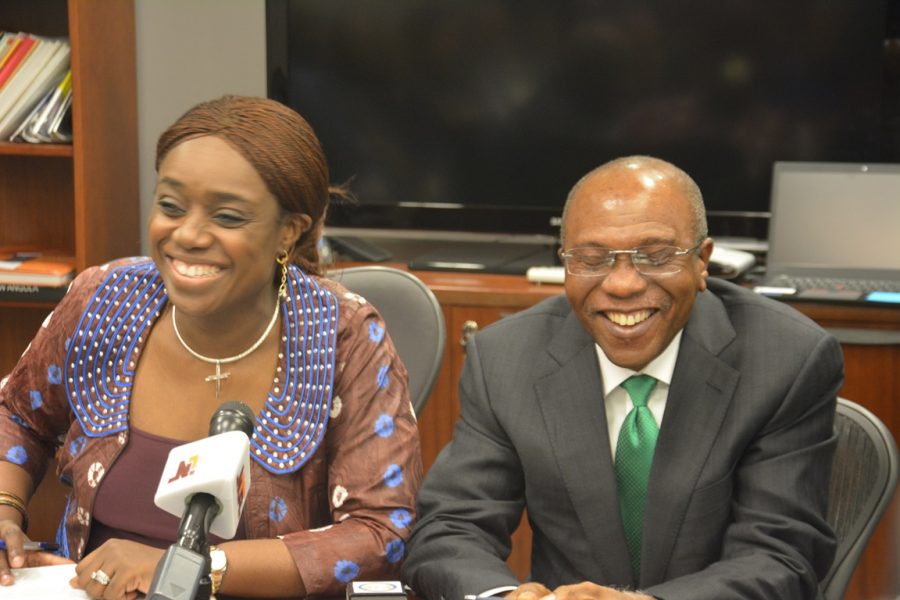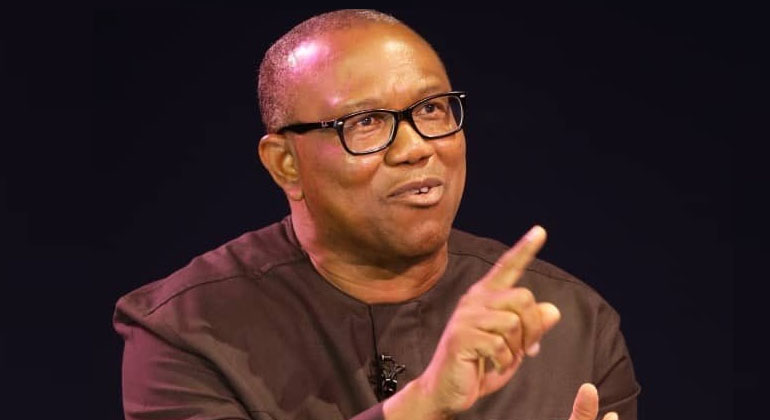The Federal government is to refinance maturing domestic debt with $3 billion treasury bills. Minister of Finance Kemi Adeosun disclosed this at a press briefing after yesterday’s Federal Executive Council (FEC) meeting.
Mrs Adeosun also attempted to allay fears of increased borrowing, insisting that instead of borrowing Naira, we are now borrowing dollars and at a cheaper rate.
Dollar denominated debts and treasury bills explained
Expensive local debts
The Federal Government via the CBN borrows money from the public by issuing treasury bills every forth-night. The amount borrowed is used to fund government’s expenditure and is repaid from revenues earned by the government. In the likely event that the government cannot repay from revenues, it simply borrows to repay.
For example, if the government is owing N1 billion and the loan matures this week, it can either pay from revenue from sale of crude oil, or borrow another N1 billion from other people to repay the N1 billion it was owing. If it chooses the option of borrowing to repay, it would have only succeeded in using one loan to repay another, effectively meaning that it still owes the N1 billion.
The only difference however, is the interest rate between the new borrowing and the one that is to be repaid. If for example, the government is borrowing at a cheaper rate to refinance the old loan, then its replacement cost is cheaper. If it is borrowing at a higher interest rate then its replacement cost is higher (more expensive).
The government has observed lately, that the cost of replacing (refinancing) maturing loans with new ones is getting higher and according to Madam Adeosun, it now wants to borrow at a cheaper rate (in dollars) to replace the expensive loans instead of borrowing at a higher rate (in Naira) which it is currently doing.
So, rather than borrow in naira to replace those debts, it is doing so in dollars because dollar interest rates are technically cheaper on paper.
Exchange rates
However, by lowering government borrowing rates, the CBN will have to seek other means to ensure that the exchange rates remains stable. Since the start of the year, the CBN has embarked on an aggressive monetary policy that have seen them borrow over N1 trillion in Open Market Operations at rates as high as 19% just to mop naira of the market. OMO is a monetary policy took that the government uses to control the supply of money in the country. It borrows via OMO at high interest rates to reduce the amount of money in circulation.
The CBN is doing this because it believes that the demand for dollars is often because there is too much naira chasing it, so to address that problem, it will mop up the cash from the economy by providing an alternative albeit expensive one.
By lowering rates, the CBN will reduce its OMO actions and therefore look for other means of ensuring the exchange rate remains stable.
How can the government switch to dollar borrowing
For the government to even replace local debts with foreign denominated debts, it will have to get the approval of the National Assembly. Assuming this is obtained, it will also need to convince foreign creditors that this is a right plan and also give them comfort that they will get their money back.
If they get all the necessary nods, the government will simply convert their dollar denominated borrowings to naira and then repay maturing treasury bills with the proceeds. Nigeria borrowed a gross amount of N3 trillion in Treasury Bills as at July 2017 and could start to repay maturing bills with converted dollar debts.
Impact of exchange rate
In our view, the immediate impact on the foreign exchange will be positive. Dollar denominated loans will typically add to the nation’s external reserves, thus helping to strengthen in naira. It could also crash government borrowing cost thus leaving investors to flee from Naira denominated assets in favour for assets that provide better yield with less risk. The CBN could thus be forced to ditch its N305 peg of the official rate and depreciate to N365 to accommodate any structural imbalance in the system.
There could be an underlying risk of a negative impact on the still fragile interbank and NAFEX rates, as investors importing money into the country may be forced to ask for higher conversion rate of the naira. However, this can be mitigated, if the CBN hands off any attempt to artificially peg rates again.
Implications for the private sector
Reduced rates
Government switching to external borrowing reduces the crowding out effect on the domestic market. Crowding out means the government has been the dominant player in the debt market, because of its nearly risk free nature. It is also able to borrow at exorbitant rates worsening the rates at which small businesses borrow. The spike in government borrowing had led to an increase in interest rates, which the private sector has so far found prohibitive. As government borrows at 20%, most business have seen their lending rates rise to as high as 30%. A drop in government lending rates will therefore make borrowing by companies much cheaper.
Exchange rate
If the government devalues its official rate from N305 to the NAFEX rate of N366-N368, due to this action, then government forex denominated fees, taxes and charges will increase. For example, import duties could spike.
Risks of borrowing in foreign currency
Mrs Adeosun opines that by borrowing in foreign currency, the government gets to pay lower interest rates and would further benefit as reserves will increase thus boosting the exchange rate.
“In terms of the impact on naira, it’s going to be positive because it means that $3 billion will be coming into our foreign reserve. It will actually increase our foreign reserves. Adeosun
While foreign denominated interest rates are cheap, Nigeria’s foreign exchange income is dependent on crude oil prices and production volumes. A drop fall in crude oil prices or a drop in production, could leave the government struggling to pay back debt. If this or any system shock occurs, Nigeria might find it difficult meeting its repayment obligations and may then have to devalue or float its currency to meet the obligations of foreign creditors.
During the last economic crisis, Nigeria refused to float the currency despite foreign pressures, in part because we did not have significant dollar obligations, that may have forced a float to avoid a default.
Is this a good move
On paper, any form of borrowing at a cheaper rate will always be welcomed. However, what is worrying is the risk involved in borrowing from foreign lenders. Unlike, local borrowings, the government can simply order the CBN to print more naira which it can use to repay loans. It does not have the luxury to do this with foreign debts.
Whilst we agree that Nigeria’s treasury bills rate are high, the loans are short-term in nature and does not actually require that we use dollar loans to refinance it. The reason why the government is borrowing at exorbitant rates is because the CBN is mopping up cash to ensure the exchange rate is stable. All it needs to do is wait for the inflation rate to fall below 14% and then crash treasury bills rate.
The real danger for Nigeria actually lies with the naira denominated debts owed by the FG which carry coupon rates of 18% and above. These are the loans Nigeria needs to refinance, if necessary, and not treasury bills.








“….In our view, the immediate impact on the foreign exchange will be positive. Dollar denominated loans will typically add to the nation’s external reserves, thus helping to strengthen in naira. It could also crash government borrowing cost thus leaving investors to flee from Naira denominated assets in favour for assets that provide better yield with less risk. The CBN could thus be forced to ditch its N305 peg of the official rate and depreciate to N365 to accommodate any structural imbalance in the system….” This is contradictory
Are we not merely treating the syntoms instead of the sickness? Shouldn’t FGN reduce its fiscal deficit and cut down on Borrowing? FGN should seek to attract direct foreign investment, cut down on fiscal deficit and reduce borrowing. Refinancing increases the foreign exchange risk, when the major foreign exchange earner remains crude oil and no diversification of the economy in sight.
Who borrows and by whom ? and for what purpose ? are you borrowing for the sakes of borrowing ,You wants to borrows in dollarThen you asks what is the dollar for ?,is there AN ALTERNATIVE FOR USING THIS DOLLAR,THE NAIRA IS THE LEGAL TENDER IN NIGERIA.WHY NOT BORROWS IN NAIRA,WHICH IS NIGERIAN IDENTITY ?
Wait A MINUTURE zenith and fidelity bank, did raises dollar bond,this year,again the cbn injected cash dollar since this year and nothing to show,news report said the cbn spend about 9 billion dollar to forces the exchange of the naira–vs the dollar.again this govt raised 2 dollar floating bond this year one in America and the recent one in London.
Baba Obj did phone kemi asking her,why she, did not follows this home-grown euro-bond with co-operation between the cbn and the ministry of finance.in this case the govt becomes the creditor and the debtor,with a slight variable entry by Nigerian stockbroker and bank.
I did not see any problem here per se.also they can uses taxes as a tool in controlling the supply of money.i.e deflation without any adverse effect on the economy.i think they chooses to destroy Nigeria willing